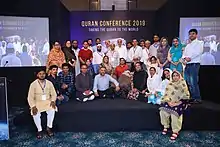| Formation | 2001 |
|---|---|
| Headquarters | New Delhi |
Founder | Maulana Wahiduddin Khan |
| Website | www |

The Centre (also spelled 'Center') for Peace and Spirituality International (CPS International) was founded by Maulana Wahiduddin Khan in 2001 (New Delhi)[1] to promote interfaith dialogue[2] and reinforce the culture of peace.[3][4] CPS International is said to encourage its member to become 'ambassadors of peace' by promoting positivity and interfaith dialogue.[5]
The organization website says CPS International draws inspiration from the Quran and Sunnah and seeks to share the spiritual principles of Islam with the world.[6] CPS International, with the support of Goodword Books, is also a global distributor of Quran translations.[7][8]
Maulana Wahiduddin Khan
Maulana Wahiduddin Khan (1925–2021) promoted inter-faith dialogue and harmony. He believed in the power of dialogue and believed conversation between religious leaders has to be based on mutual respect.[9] Khan was prolific writer and was awarded the Padma Vibhushan, India's second-highest civilian award, for his contributions towards peace and spirituality.[10]
Notable members
- Wahiduddin Khan, Founder[11]
- Saniyasnain Khan, Trustee and Secretary[12]
- Rajat Malhotra, International Global Coordinator[13][14]
- Prof. Farida Khanam, Chairperson[15][16]
References
- ↑ Parray, Dr Tauseef Ahmad (28 April 2021). "A thinker in the eyes of scholars". Greater Kashmir. Retrieved 2022-02-27.
- ↑ "Maulana Wahiduddin Khan dies". The Indian Express. 2021-04-22. Retrieved 2022-02-27.
- ↑ "All you need to know about Padma Vibhushan awardee Maulana Wahiduddin Khan". Hindustan Times. 2021-01-25. Retrieved 2022-02-27.
- ↑ "Maulana Wahiduddin Khan hospitalized after testing COVID-19 positive". The Siasat Daily. 2021-04-13. Retrieved 2022-02-27.
- ↑ "Maulana Wahiduddin Khan was an Islamic scholar who believed in dialogue". The Indian Express. 2021-04-23. Retrieved 2022-02-27.
- ↑ "CPS International | CPS International". www.cpsglobal.org. Retrieved 2022-02-27.
- ↑ The Quran. Vaḥīduddīn K̲h̲ān̲, Farīdah K̲h̲ānam. New Delhi: Goodword Books. 2009. ISBN 978-81-7898-653-1. OCLC 607794294.
{{cite book}}: CS1 maint: others (link) - ↑ "The Quran | Goodword / Islamic Books". www.goodwordbooks.com. Retrieved 2022-02-27.
- ↑ "Maulana Wahiduddin Khan was an Islamic scholar who believed in dialogue". The Indian Express. 2021-04-23. Retrieved 2022-02-27.
- ↑ "As an Islamic Teacher, Maulana Wahiduddin Khan Propagated Peace, Positive Thinking". The Wire. Retrieved 2022-02-27.
- ↑ Dahlkvist, Mattias (2019). The politics of Islam, non-violence, and peace the thought of Maulana Wahiduddin Khan in context. Tomas Lindgren, Jan Hjärpe, Umeå universitet Humanistiska fakulteten. Umeå. ISBN 9789178551453. OCLC 1128632884.
{{cite book}}: CS1 maint: location missing publisher (link) - ↑ "Maulana Wahiduddin Khan succumbs to Coronavirus". ummid. Retrieved 2022-02-27.
- ↑ "Give Peace A Chance". Deccan Chronicle. 2021-03-18. Retrieved 2022-04-20.
- ↑ "DrRajat discusses one of the most erroneous believes about Quran". The Siasat Daily. 2019-10-15. Retrieved 2022-04-20.
- ↑ "Scholars divided on whether mosques are integral to Islam". The Sunday Guardian Live. 2018-07-14. Retrieved 2022-05-25.
- ↑ Parray, Dr Tauseef Ahmad (28 April 2021). "A thinker in the eyes of scholars". Greater Kashmir. Retrieved 2022-05-25.